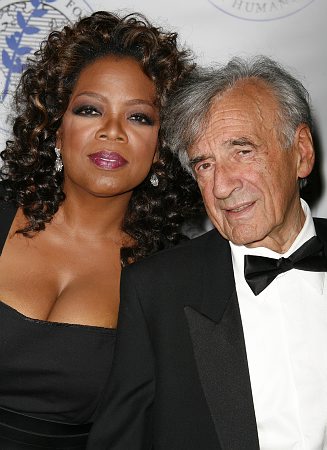By Carolyn Yeager
On Tuesday, January 17, 2006, Amazon.com announced that it was changing the categorization of a new translation of Elie Wiesel’s Night from novel to memoir.
Amazon would also revise the editorial description of the original edition to make clear that they consider the book a memoir, not a novel. “We hope to make these changes as quickly as possible,” said Jani Strand, a spokeswoman for the online retailer. The day before, Oprah Winfrey had announced that Night was her latest book club choice, displacing her previous selection, James Frey’s A Million Little Pieces.

Left: Oprah Winfrey and Elie Wiesel pose together at the Elie Wiesel Foundation for Humanity Award Dinner at the Waldorf Astoria Hotel on May 20, 2007. Winfrey was honored with the Humanitarian Award for “positively impacting people all over the world, especially children.” One year earlier, she had selected Wiesel’s “Night” for her popular book club “pick” which sent it immediately to the top of the national bestseller lists.
The sudden switch from fiction to non-fiction caused some discussion and questions, which Strand brushed away by saying, “Amazon.com’s data source for the Oprah Book Club edition of Night inaccurately classified the book as fiction.” She declined to offer details. The book, re-classified as “Autobiography” and blessed by Oprah, was already No.3 on Amazon.com as of that Tuesday afternoon! Wiesel, interviewed later with his literary agent Georges Borchardt, insisted they had never portrayed it as a novel.